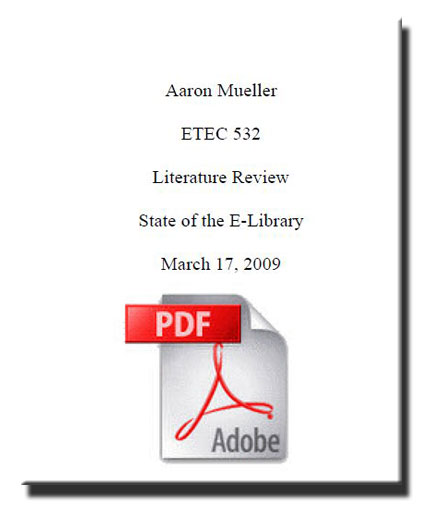Welcome to the Reference Section!
In a traditional Library, the Reference section was created to house a special collection. These resources were typically: rare, expensive, unique, in high-demand, and needed to be always accessible to patrons. This lead to restrictions on their circulation. You could only take out books for a couple of hours, or you had to photocopy what you needed right there. This is all beginning to change with digital resources! No longer will there be restrictions on when, who, for how long and what you can access from your local Cybrary. Instead of waiting your turn for the "R" section of the encyclopedia, you can immediately find the information you seek using only your web browser, from your home, at any time.
The Reference section for my ePortfolio will have a slightly different focus, in that I hope to share with you some of the key resources I have been reading and using in my Masters, as well as in my professional role. The artifact that I feel best captures the essence and foundational aspects of Digital Libraries and Information Literacies is a Literature Review I completed. This Literature review examined many of the key articles and papers written on this topic.
This Literature Review, which was done early on in my Masters, was a great chance to compile all the relevant literature already written on this topic. While there are many good articles, it is still an emerging field of study and ripe for many research opportunities. The state of the E-Library, or Digital Library is still very much undecided, with competing visions, goals and opportunities.
To examine the evolution of the Reference section from the traditional to the digital, it appears this will be one section that might disappear completely. There is no longer any need to protect and preserve delicate and unreplaceable resources, as only digital copies are being distributed. A Digitized Library can simply scan in these materials, post them in their catalogue, accessible through the internet, allowing an unlimited number of patrons access 24 hours a day, seven days a week. We no longer have the problem that the reference section was a solution for!
ARTIFACT: Literature Review - State of the E-Library
COURSE: ETEC 532
DATE: March 2009
ESSENTIAL LINKS:
|
 |
The rest of this section will be a Works Cited of materials, resources, and articles that I have used and referenced throughout this ePortfolio.
WORKS CITED
Bates, A. & Poole, G. (2003). Effective teaching with technology in higher education: Foundations for success. New York: Wiley, John, & Sons.
Bruce, C. (2002). Information literacy as a catalyst for educational change: A background paper. White Paper prepared for UNESCO, the U.S. National Commission on Libraries and Information Science, and the National Forum on Information Literacy. Information Literacy Meeting of Experts, Prague, The Czech Republic, 1-17.
Bruce, C. (2003). Seven faces of information literacy: Towards inviting students into new experiences [Powerpoint slides]. Retrieved from: http://www.bestlibrary.org/digital/files/bruce.pdf
Cybraries. (March 2010). Retrieved from the ETEC 510 Design Wiki: http://sites.wiki.ubc.ca/etec510/Cybraries
Moon, Jenny, PDP Working paper 4: Reflection in higher education learning National Educational Technology Standards for Students. (2007). National educational technology standards (nets•s). Retrieved from: http://www.iste.org/Content/NavigationMenu/NETS/ForStudents/2007Standards/NETS_for_Students_2007_Standards.pdf
Mueller, A. (2009, June 10th). Media Project #1 Intellectual Property Rights in Designing Online Courses [Video file]. Retrieved from: http://www.youtube.com/watch?v=oUGzkCbpuX8&feature=player_embedded
Mueller, A. (2009, July 9th). Media Project #2 Artificial Intelligence: What is 'smart'?[Video file]. Retrieved from: http://www.youtube.com/watch?v=oiNuKZm0k_c
Mueller, A. (2010, April 10th). My Digital Story [Video file]. Retrieved from: http://prezi.com/niqp4zu-mq4o/my-digital-story/
Mueller, A. (2009). The Evolutionary Library. Unpublished manuscript.
Mueller, A. (2009). Literature Review - State of the E-Library. Unpublished manuscript.
Mueller, A., & Ramroop, O., & Wood, S., & Ling, L. (2010, April). The Lighthouse. Retrieved from http://moodle.met.ubc.ca/course/enrol.php?id=96
Prensky, M. (2001). Digital natives, digital immigrants. On the Horizon, 9(5), 1–2. Available: http://www.marcprensky.com/writing/Prensky%20-%20Digital%20Natives,%20Digital%20Immigrants%20-%20Part1.pdf
Wesch, M. (Producer). (2007). A vision of students today. Kansas University. [Web]. Retrieved from: http://ksuanth.weebly.com/wesch.html
Wenger, E. (2006). Communities of practice: a brief introduction. Retrieved from: http://www.ewenger.com/theory/index.htm
Yu-Mei, W. (2007). Riding to the future - An investigation of information literacy skills of students at an urban university as applied to the web environment. International Journal on E-Learning, 6(4), 593-603. |
|
|

